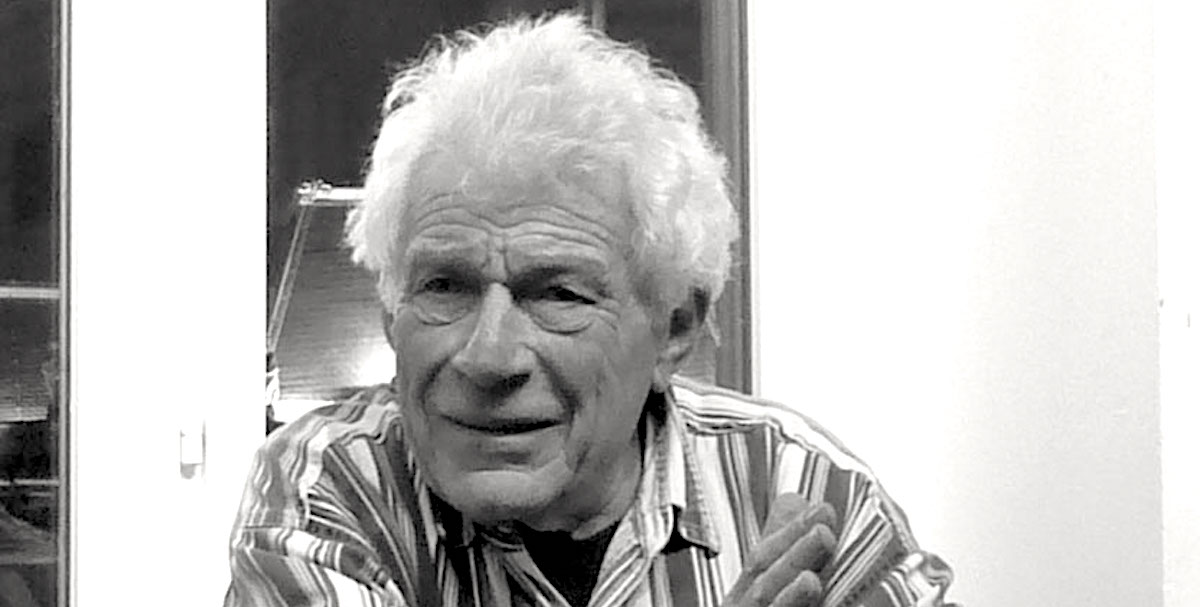The artist, critic, poet, and Booker prize-winning author John Berger has died age 90. Best known in art circles for his essay on art criticism, ‘Ways of Seeing’, it accompanied a popular BBC series and is still used as a university text. Berger was a novelist, painter, and poet. His novel G. won the 1972 Booker Prize.
Born in Hackney, London, England to Stanley and Miriam Berger, Berger was educated at St Edward’s School, Oxford. His father, a Hungarian émigré from Trieste, had been an infantry officer on the Western Front during the First World War and was awarded the Military Cross and an OBE. Berger served in the British Army from 1944 to 1946; he then enrolled in the Chelsea School of Art and the Central School of Art in London.
Berger born (5 November 1926) began his career as a painter and exhibited work at a number of London galleries in the late 1940s.His art has been exhibited at the Wildenstein, Redfern and Leicester Galleries in London. Berger has continued to paint throughout his career. While teaching drawing (from 1948 to 1955), Berger also became an art critic, publishing many essays and reviews in the New Statesman. His Marxist humanism and his strongly-stated opinions on modern art combined to make him a controversial figure early in his career. He titled an early collection of essays Permanent Red, as part as a statement of political commitment, and later wrote that before the Soviet Union achieved nuclear parity with the United States he had felt constrained not to criticise the former’s policies; afterward his attitude toward the Soviet state became considerably more critical.
When accepting the Booker, Berger pointedly donated half his cash prize to the Black Panther Party in Britain
When accepting the Booker, Berger pointedly donated half his cash prize to the Black Panther Party in Britain
In 1958, Berger published his first novel, A Painter of Our Time, which tells the story of the disappearance of Janos Lavin, a fictional exiled Hungarian painter, and his diary’s discovery by an art critic friend called John. The book’s political currency and detailed description of an artist’s working process led to some readers mistaking it for a true story. After being available for a month, the work was withdrawn by the publisher, under pressure from the Congress for Cultural Freedom. The novels immediately succeeding A Painter of Our Time were The Foot of Clive and Corker’s Freedom; both presented an urban English life of alienation and melancholy. Berger moved to France in 1962 due to his distaste for life in Britain.
In 1972, the BBC broadcast his television series Ways of Seeing (directed by Mike Dibb) and published its companion text, an introduction to the study of images. The work was in part derived from Walter Benjamin’s essay The Work of Art in the Age of Mechanical Reproduction. Berger’s novel G., a picaresque romance set in Europe in 1898, won both the James Tait Black Memorial Prize and the Booker Prize in 1972. When accepting the Booker, Berger pointedly donated half his cash prize to the Black Panther Party in Britain and retained half to support his work on the study of migrant workers that became A Seventh Man, insisting on both as necessary parts of his political struggle.
Many of his texts, from sociological studies to fiction and poetry, deal with experience. Berger’s sociological writings include A Fortunate Man: The Story of a Country Doctor (1967) and A Seventh Man: Migrant Workers in Europe (1975). His research for A Seventh Man led to an interest in the world which migrant workers had left behind: isolated rural communities. It was his work on this theme that led him to settle in Quincy, a small village in the Haute-Savoie, where he has lived and farmed since the mid-1970s. Berger and photographer Jean Mohr, his frequent collaborator, seek to document and to understand intimately the lived experiences of their peasant subjects. Their subsequent book Another Way of Telling discusses and illustrates their documentary technique and treats the theory of photography both through Berger’s essays and Mohr’s photographs. His studies of single artists include most prominently The Success and Failure of Picasso (1965), a survey of that modernist’s career; and Art and Revolution: Ernst Neizvestny, Endurance, and the Role of the Artist, on the Soviet dissident sculptor’s aesthetic and political contributions.
In the 1970s, Berger collaborated with the Swiss director Alain Tanner on several films; he wrote or co-wrote La Salamandre (1971), The Middle of the World (1974) and Jonah who will be 25 in the year 2000 (1976).[6] His major fictional work of the 1980s, the trilogy Into Their Labours (made up of the novels Pig Earth, Once in Europa, and Lilac and Flag), treats the European peasant experience from its farming roots into contemporary economic and political displacement and urban poverty. In 1974, Berger co-founded the “Writers & Readers Publishing Cooperative Ltd” in London with Arnold Wesker, Lisa Appignanesi, Richard Appignanesi, Chris Searle, Glenn Thompson and others.[7] The cooperative was active until the mid-1980s.
In recent essays Berger has written about photography, art, politics, and memory; he published in The Shape of a Pocket a correspondence with Subcomandante Marcos, and has written short stories appearing in the Threepenny Review and The New Yorker. His sole volume of poetry is Pages of the Wound, though other volumes such as the theoretical essay And Our Faces, My Heart, Brief as Photos contain poetry as well as prose. His recent novels include To the Wedding, a love story dealing with the AIDS crisis, and King: A Street Story, a novel on homeless and shantytown life told from the perspective of a street dog. Initially, Berger insisted that his name is kept off the cover and title page of King, wanting the novel to be received on its own merits.
Berger resided in France for over 50 years. Read More
John Peter Berger (5 November 1926 – 2 January 2017) Photo: Ji-Elle Creative Commons

